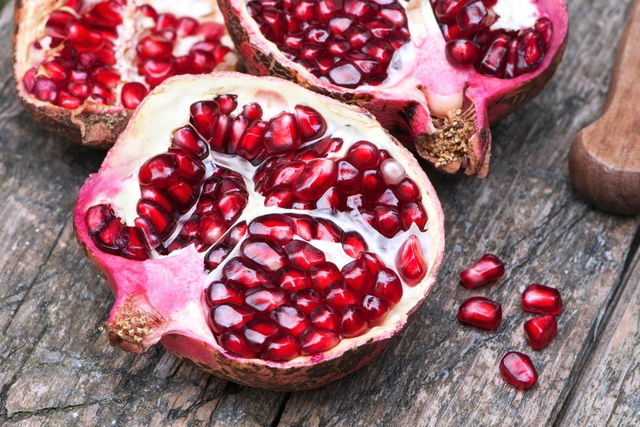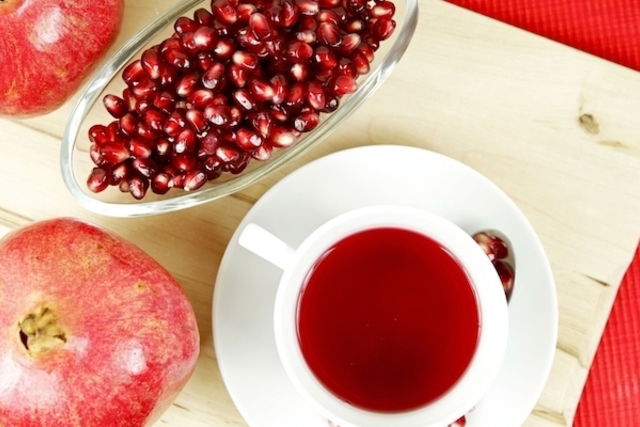Pomegranate is a fruit that contains many antioxidant compounds like flavonoids, quercetin and ellagic acid that can provide many health benefits. These antioxidants can help to prevent Alzheimer’s disease and certain types of cancer. These can also manage high blood pressure and provide anti-inflammatory and antiseptic effects that can be used to relieve sore throats, for example.
In addition, pomegranate can be included in weight loss diets, as it is low in calories and rich in fiber. This fruit helps to keep you full and thereby prevent over-eating.
Pomegranate is mildly sweet and its seeds can be consumed or used in smoothies, salads and yogurt, Pomegranate peel, leaves and stalk can be used for teas. Dietary supplements are made by dehydrating the peel, and concentrated oil can be extracted from the seeds for anti-aging and immune system products.

Health benefits
The main benefits that pomegranate can offer include:
1. Preventing cancer
Pomegranate pulp and peel are rich in flavonoids and tannins, which are antioxidant compounds present in many fruits and vegetables. They can help to prevent many types of cancer, like prostate, lung, skin and breast cancer.
Some recent studies have looked at the possibility of using pomegranate extract to treat many types of cancer. Urolithin B and gallic acid, which are compounds found in the peel, leaves and seeds, have a potent antioxidant action that can decrease or inhibit the proliferation of cancer cells.
2. Preventing Alzheimer’s disease
The seeds and peel have antioxidant and anti-inflammatory compounds that help to manage neuron function. This effect can improve memory and prevent the development of Alzheimer’s.
This property is particularly found in pomegranate peels, which contains 10 times more antioxidants in comparison with the pulp.
3. Preventing heart disease
Pomegranate juice is rich in compounds with anti-inflammatory and antioxidant properties that boost HDL cholesterol. This can be a key factor in preventing cardiac disease, like heart attach, arrhythmia and atherosclerosis. Pomegranate juice can also help to decrease triglyceride levels, which is a type of gat that is associated with cardiac disease if it accumulates to high levels.
4. Strengthening the immune system
Pomegranate is a fruit that is rich in vitamin C and antioxidants that prevent the growth of harmful bacteria, as well as increase the quantity of beneficial bacteria in the gut. This helps to balance out the intestinal flora, which leads to better absorption of vitamins and minerals. In addition to strengthening the immune system, this can prevent health conditions like the flu, diarrhea and herpes.
In addition, pomegranate extracts taken as supplements can strengthen the immune system of patients with a history of inflammatory disease, like rheumatoid arthritis, chronic obstructive pulmonary disease and inflammatory bowel syndrome.
5. Reducing blood pressure
The antioxidants present in pomegranate promote blood vessel dilation, which boosts circulation and prevent high blood pressure in people with normal levels.
Some studies show that drinking about 240 ml of pomegranate juice per day for 14 days can decrease high blood pressure. It is important to note that pomegranate juice should not replace prescription medication.
6. Maintaining skin health
Pomegranate is rich in ellagitannins, anthocyanins and catechins, which are antioxidants present in pomegranate seeds, peel and juice. These compounds contain antioxidant and anti-inflammatory compounds that protect the skin from UV rays, which can prevent the development of skin cancer.
The compounds in this fruit also help to prevent early aging. They have an astringent action, which help to dry out the skin, as well as an antiseptic action, which help to treat combination skin, oily skin and acne.
7. Treating diarrhea
Pomegranate are naturally rich in tannins, which are compounds that boost water absorption and decrease intestinal movement. It also contains antioxidants that help to regulate intestinal flora. For this reason, teas made from pomegranate peels or stalk are a great way to treat diarrhea.
8. Preventing gingivitis and periodontal disease
Pomegranate contains compounds like flavonoids, anthocyanins, phenolic acids and tannins. These antioxidants and antimicrobials are beneficial for the treatment of gingivitis and gum disease. To obtain this benefit, you can use pomegranate peel and flowers to make homemade gargling solutions.
Studies show that treatment with pomegranate extract can prevent the growth and spread of bacteria that causes gingivitis and decrease bleeding from periodontal disease.
9. Preventing and treating throat infections
Pomegranate peel and stalk can efficiently prevent and treat throat inflammation from laryngitis, pharyngitis and tonsillitis. To obtain these benefits, you should make tea using pomegranate peels and gargle with it 3 times per day.
10. Preventing diabetes
Fresh pomegranate fruit is rich in antioxidants, which can improve pancreatic function. The pancreas is responsible for the production of insulin, and these antioxidants can help to regulate blood sugar. This can prevent diabetes and control fluctuating blood sugar levels.
Some studies show that consuming fresh juice made from pomegranate flower or seeds can decrease blood sugar levels in some people with type 2 diabetes within a few hours of drinking.
11. Promoting weight loss
In addition to its various health benefits, pomegranate also contains few calories and is a great source of fiber. It can help to control appetite and help with water retention and weight loss.
Nutritional information
The following table outlines the nutritional information found in 100 g of fresh pomegranate:
It is important to remember that although it contains several health benefits, pomegranates should not replace medications or other therapy prescribed by your doctor.
How to make pomegranate tea
To make pomegranate tea, you can use the peel, stalk, leaves and flower.
Boil 1 cup of water in a pot and then add 10 g of pomegranate peel, making sure to remove the pot from heat. Cover and allow to soak for 10 to 15 minutes. Then strain and drink while warm, 2 to 3 times per day.
You can also make pomegranate juice, which is made by pureeing 1 pomegranate with 1 cup of water in a blender. Drink once mixed, ideally without any added sugar.

Possible side effects
Consuming pomegranate peel and stalk in large quantities is toxic and cause side effects like nausea and vomiting. It can even lead to intoxication, which can cause respiratory arrest.
For safety reasons, pomegranate is not advised for children under 2 years of age. Pomegranate should be avoided by patients with gastritis, as it can irritate the stomach.
Pregnant or breastfeeding women should consult their doctor before consuming pomegranates.
Healthy pomegranate recipes
Pomegranate seeds are frequently used in savory meals, like salads and chicken, as well as in sweet desserts, like yogurt, mousse and sweet tapioca.
1. Green salad with pomegranate
Ingredients:
- 1 handful of arugula
- 1 handful of crispy lettuce
- 1 pomegranate
- 1 green applie with the peel
- 1 lemon
How to prepare:
Wash and dry the lettuce and arugula, then tear them into a bowl. Cut the apple in thin slices and soak in water with a few drops of lemon juice for 15 minutes. Remove the pomegranate seeds and mix them with the leaves and apples. Serve with olive oil, vinaigrette or balsamic vinegar.
2. Couscous tapioca with pomegranate
Ingredients:
- 250 ml of granulated tapioca
- 100 ml of skim milk
- 200 ml of homemade coconut milk
- 50 g of grated coconut
- 2 and a half tablespoons of brown sugar or sweetener
- 1 pomegranate
How to prepare:
Mix the tapioca, coconut, and sugar in a bowl and set aside. Heat the skim milk and coconut milk in a pot until it starts to foil. As it cools down, add the tapioca mix and mix until it thickens. Allow to cool. Remove the seeds from the pomegranate and set aside. Once ready to serve, add the seeds.
